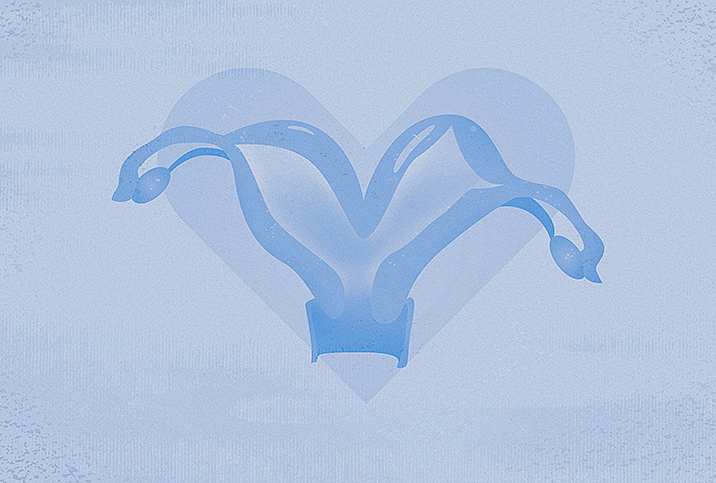What Does It Mean to Have a Heart-Shaped Uterus?

I went in for an ultrasound and when my doctor called with my results, she informed me that my uterus is shaped like a heart.
What? was my exact thought at that moment. But I suppose since I've loved glitter and pink my entire life, it only made sense that my womb would fit the theme.
"Does that mean it's just cute?" was the first question I asked.
"Don't worry too much, honey. It's a common abnormality." And that was the extent of the explanation I received.
How can something be both common and abnormal? And what did it mean? These were questions my physician was not able to answer clearly, so I turned to an expert for the facts.
Following, you'll find an overview of what's medically referred to as an arcuate uterus. May you find yourself more informed than I was upon diagnosis. Because your health matters, and even something considered "common" deserves a clear explanation.
What is an arcuate uterus?
Kelly Culwell, M.D., a board-certified OB-GYN and nationally renowned women's health expert, told me that an arcuate uterus is a normal variant of the uterine shape in which the top of the uterus (the fundus) has a slight indent. This indentation is usually less than 1 centimeter. It is present at birth, and is simply the result of the development of the uterus.
The uterus starts as two tubes that merge during fetal development. This merging can lead to a variety of shapes depending on how completely the tubes fuse.
So the term "common abnormality" means this condition is recognized as a common and normal variation in the shape of the uterus. In other words, it happens to a lot of people who have a uterus and can be easily diagnosed with a transvaginal ultrasound.
Are there different variations?
The good news is, a true arcuate uterus is usually not associated with any bad outcomes, said Culwell. "True" simply means you are not diagnosed with one of the more rare presentations listed below. These less-common malformations can cause problems:
Septate uterus: In this variant, a "wall" (septum) comes down the middle from the top of the uterus, dividing it.
Bicornuate uterus: This is when the indent at the top of the uterus is more pronounced. The two halves of the uterus are therefore separated at the top.
As with the standard presentation of the arcuate uterus, these variants are congenital abnormalities that arise when the two tubes that are supposed to come together to form the uterus don't fuse properly.
Are there any risks to having a heart-shaped uterus?
Culwell explained it's now accepted there are no risks associated with a arcuate uterus, and most people don't experience any symptoms. However, those with a bicornuate or septate uterus can have difficulty becoming pregnant and are at an increased risk for miscarriage. A higher likelihood for preterm birth or growth restriction of the fetus may also be present. These risks result from the size and shape of the uterus when it comes to these two variants.
I suffer from very severe endometriosis, so I also wanted to know if there was any correlation between an arcuate uterus and endometriosis. Culwell assured me there are no additive risks with an arcuate uterus and endometriosis. An arcuate uterus will not worsen or impact menstrual symptoms such as cramps, either.
What treatments are available for an arcuate uterus?
An arcuate uterus generally does not require any treatment.
However, if you find yourself diagnosed with one of the above variants, the uterine septum (the "wall" separating the uterus in a septate uterus) can be removed surgically. Surgical treatment may need to be done for anyone with a heart-shaped uterus who has difficulty getting pregnant or is experiencing recurrent miscarriages.
Aside from that specific scenario, no additional follow-up is needed after being diagnosed with an arcuate uterus.
So, if you think that heart-shaped things are adorable, then, yes, your uterus is pretty much just cute. But don't expect to start spouting love poems anytime soon as a result.
I found out about mine by accident, but if you're ever curious as to whether or not you were born with an arcuate uterus, ask your doctor about it next time you're in for an ultrasound.

















